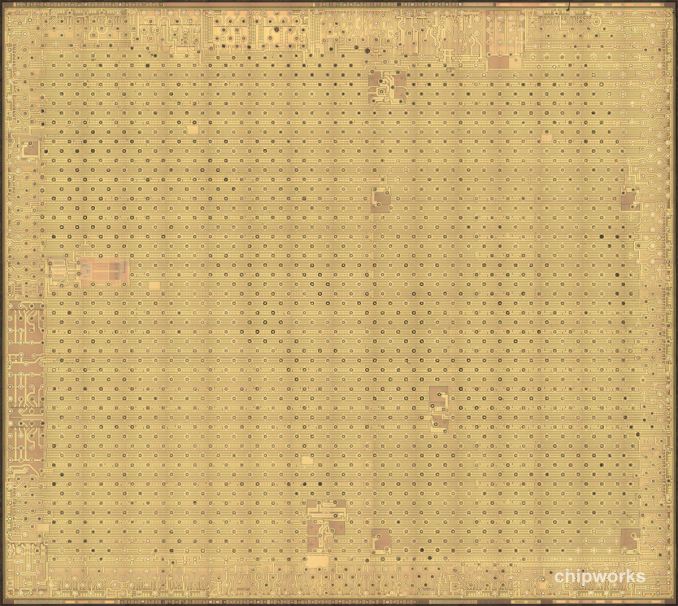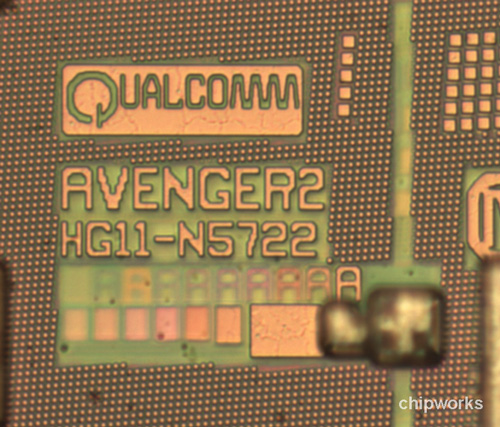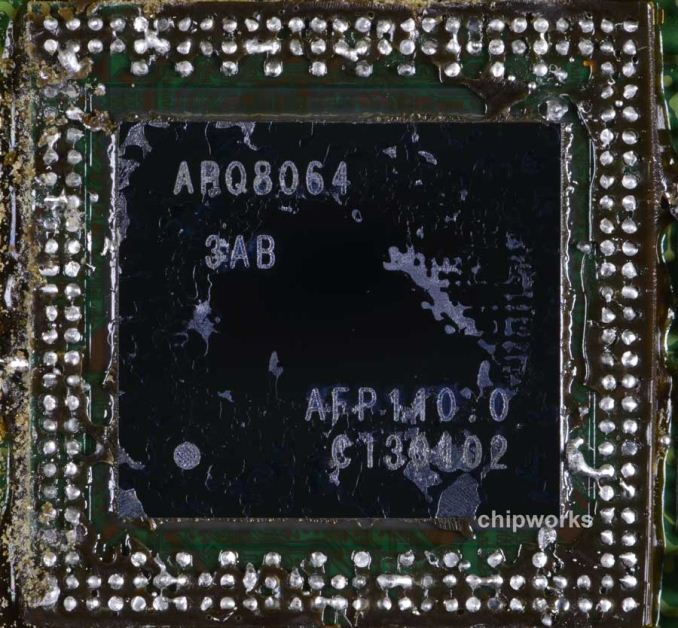Samsung Galaxy S 4 Review - Part 1
by Brian Klug on April 24, 2013 12:01 AM ESTGalaxy S 4 - Powered by a Better Snapdragon 600 (APQ8064AB)?
At a high level, Samsung's Galaxy S 4 integrates Qualcomm's Snapdragon 600 SoC. From what Qualcomm told us about Snapdragon 600, we're dealing with four Krait 300 cores and an Adreno 320 GPU. The Krait 300 cores themselves are supposed to improve performance per clock over the original Krait CPU (Krait 200) through a handful of low level microarchitectural tweaks that we've gone through here. The Krait 300 design also allegedly improves the ability to run at higher frequencies without resorting to higher voltages. This isn't the first time we've talked about Snapdragon 600, but since then a few things have come to light.

Snapdragon 600 from HTC One - Chipworks
For starters, Chipworks got their hands on a Snapdragon 600 SoC (from an HTC One) and delayered the SoC. In its investigation, Chipworks discovered that Snapdragon 600 had the exact same die area as the previous generation Snapdragon S4 Pro (APQ8064). Also, although you'd expect APQ8064T markings on the chip itself, the part carried the same APQ8064 label as previous S4 Pro designs.

Avenger 2 Markings on Snapdragon 600 die from HTC One - Chipworks
Chipworks did note however that there were some subtle differences between a standard APQ8064 and the Snapdragon 600 SoC from the HTC One. The Snapdragon 600 from the One is labeled with an Avenger2 codename rather than Avenger, the latter was apparently present on prior APQ8064 designs. Chipworks also noticed differences in the topmost metal layer, although it's not clear whether or not they stopped there or found no differences in lower layers.
All of this points to a much more subtle set of physical differences between APQ8064 and the earliest Snapdragon 600s. Metal layer changes are often used to fix bugs in silicon without requiring a complete respin which can be costly and create additional delays. It's entirely possible that Krait 300 was actually just a bug fixed Krait 200, which would explain the identical die size and slight differences elsewhere.
That brings us to the Galaxy S 4. It's immediately apparent that something is different here because Samsung is shipping the Snapdragon 600 at a higher frequency than any other OEM. The Krait 300 cores in SGS4 can run at up to 1.9GHz vs. 1.7GHz for everyone else. Curiously enough, 1.9GHz is the max frequency that Qualcomm mentioned when it first announced Snapdragon 600.
Samsung is obviously a very large customer, so at first glance we assumed it could simply demand a better bin of Snapdragon 600 than its lower volume competitors. Looking a bit deeper however, we see that the Galaxy S 4 uses something different entirely.
APQ8064 from a Snapdragon 600 based HTC One - Chipworks
Digging through the Galaxy S 4 kernel source we see references to an APQ8064AB part. As a recap, APQ8064 was the first quad-core Krait 200 SoC with no integrated modem, more commonly referred to as Snapdragon S4 Pro. APQ8064T was supposed to be its higher clocked/Krait 300 based successor that ended up with the marketing name Snapdragon 600. APQ8064AB however is, at this point, unique to the Galaxy S 4 but still carries the Snapdragon 600 marketing name.
If we had to guess, we might be looking at an actual respin of the APQ8064 silicon in APQ8064AB. Assuming Qualcomm isn't playing any funny games here, APQ8064AB may simply be a respin capable of hitting higher frequencies. We'll have to keep a close eye on this going forward, but it's clear to me that the Galaxy S 4 is shipping with something different than everyone else who has a Snapdragon 600 at this point.











335 Comments
View All Comments
vipuls1979 - Wednesday, May 22, 2013 - link
I have posted a comparision on http://mobiknowhow.blogspot.com and i personally think one should go ahead with S4 instead of HTC Onesrihari - Thursday, May 23, 2013 - link
Anand, non-technical people will not be able to judge the better phone by looking at the GPU benchmark onscreen numbers(with varying screen resolutions for different phone). so, i suggest you to post *only* GPU benchmark off-screen numbers.cadjak - Saturday, May 25, 2013 - link
This device has a primary function that seems NOT to get examined in reviews. How well does it send and/or receive a simple voice communication? The S3 had some serious issues around reception in areas with marginal LTE signal. I have had to tweak mine to get it to reliably work as a phone, by setting it to CDMA auto (PRL). I am trying to find out if the S4 will have similar connection issues, but I'm not having much luck.vipuls1979 - Monday, May 27, 2013 - link
i would sincerely like to go with Galaxy S4 rather then HTC one, updates released by Samsung are more quicker then HTC anddid you know a recent Press Trust of India Release says Camera sales are down due to Smartphone camera
full report at http://mobiknowhow.blogspot.com
paul_59 - Monday, May 27, 2013 - link
Interesting comments about differences between S4 8064AB &.HTC One 8064TI ran a custom kernel and overclock HTC One to 1.89Ghz (S4 1.9Ghz)
Got sunspider 0.91 benchmark result 550 ms .
I realise benchmarking is subject to lots of variables
vipuls1979 - Thursday, June 6, 2013 - link
Guys, i hope you must be aware of latest blackberry Q10 launched in Indiafor more details visit http://mobiknowhow.blogspot.com/2013/06/blackberry...
MonkeyK - Thursday, June 13, 2013 - link
Are the battery test stats really right? 1 hour of additional Wifi web browsing time is huge. But every other review that I have read shows the S4 having slightly longer battery life. So what gives?elucid - Tuesday, June 18, 2013 - link
I guess Part 2 is not coming? If it still is, a battery test with a real LTE network like Verizon (or even ATT) would be interesting.reapergato - Tuesday, June 18, 2013 - link
2 months later and still no Part 2? I sure hope with all that extra real world testing the part 2 article will knock our socks off....Optimummind - Sunday, June 30, 2013 - link
It's been over 2 months and still no Part 2?Also, after re-reading the review, it seems the article has been edited from its original release.